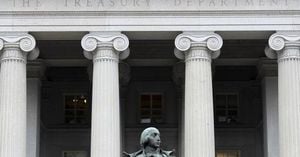Privacy Concerns Amidst Rising AI Data Scraping
On February 2, 2024, famed singer-songwriter and actor Lainey Wilson captured the growing outrage over misuse of artists' likenesses at a House Judiciary hearing held in Los Angeles, California. Although she wasn't on stage belting out hit songs, her words unmistakably conveyed the frustration many individuals, particularly artists, have been feeling. "I do not have to tell you how much of a gut punch it is to have your name, your likeness, or your voice ripped from you and used in ways you can never even begin to fathom or would ever allow. It is wrong. Plain and simple," Wilson stated, alluding to the recent unauthorized use of her image and voice.
Wilson's sentiments echo the frustrations of numerous musicians and journalists who have increasingly found their work exploited through artificial intelligence (AI). A glaring example occurred back in June 2023 when Wilson and fellow country singer Luke Combs discovered their likenesses were used without permission to promote keto weight loss gummies via AI-generated conversations. The campaign aimed to con people by implying the duo endorsed the product, igniting outrage and concern about the data scraping practices being employed by major tech companies.
By the time of the hearing, these feelings had boiled over among creatives who felt betrayed and exploited by technologies they believed should empower them, not erode their rights. Wilson's impassioned remarks underscored the mounting frustration with big tech's operations, driven mainly by the intense scramble for dominance among companies like OpenAI, Google, and Meta.
On April 6, 2024, the New York Times reported unsettling developments within these major corporations. Their scramble to dominate the AI market had apparently led them to risk legal repercussions by utilizing copyright-protected works to train their AI models. While these giants race toward innovative breakthroughs, the crux of the dilemma lies squarely on the shoulders of consumers and artists caught between the corporate rivalry and the erosion of individual data privacy.
A troubling trend has surfaced as AI data scraping has escalated within recent years. The competition for supremacy among AI developers is insatiable, resulting in rampant gathering of all types of data necessary to enable realistic speech, image generation, and language translation. Sadly, this growth trend has come at the price of ethical guidelines and user consent.
Most concerning is the extensive reach of AI companies. According to the New York Times report, OpenAI, Google, and Meta have reportedly wiped out nearly all quality publicly available data. While initial data scraping began with openly accessible resources like Wikipedia and material under Creative Commons licenses, by 2021, the well of data appeared to be running dry.
Desperate to gather information, Google revealed contentious changes to its privacy policy taking effect over the July 4 holiday weekend. Critics speculate this was strategically timed, hoping few would notice during the celebrations. The revamped policy expanded the company’s scope to potentially siphon insights from anywhere deemed "publicly available online," with no guarantee to users about what data were being used. This included everything from Google Docs to information from its different free office applications.
OpenAI, too, faced criticism as it utilized Whisper, its speech recognition tool, to harvest data from YouTube videos—many of which are subject to copyright laws. Unsurprisingly, the responses were swift, and key players began questioning the ethics driving these data practices.
According to the New York Times, Google turned a blind eye to these activities to dodge potential investigations stemming from its own data mining practices. Meanwhile, Meta explored purchasing the major publishing house Simon & Schuster with the intent of using copyrighted materials to train its AI.
Lainey Wilson’s insightful comments reflect the larger issue at hand. "It’s not just artists who need protecting. The fans need it, too," she highlighted during the hearing, emphasizing the need for swift action. Activists are already mobilizing, with the Human Artistry Campaign taking center stage in advocating policies to safeguard creative professionals and their audiences from predatory practices associated with AI misuse.
Organizations like the American Civil Liberties Union and Algorithmic Justice League have also stepped up, demanding legislative measures to counter bias and protect individuals against harmful data practices within the AI ecosystem. Initiatives are underway as numerous professionals and activists devolve methods to take control of their data.
For example, the British publication The Guardian imposed blocks on OpenAI’s access to its website to prevent scraping for training purposes. Legal actions are becoming increasingly common as creative communities hash out strategies to shield their rights from infringing AI technologies.
With time running out to establish safeguards against relentless data scraping, the collective stand of these organizations could be the last line of defense protecting the privacy rights of millions. The challenges posed by the advancement of AI are complex, yet some organizations denote the need for urgent and thoughtful responses through regulation to put brakes on the accelerating erosion of privacy.
Although the floodgates for AI data scraping closed swiftly, the repercussions will be felt deep and wide across every corner of the digital world, urging us to confront where we draw the line between passion for innovation and the sanctity of personal rights.



